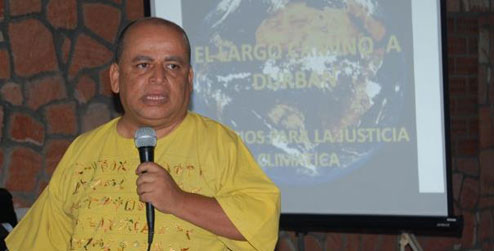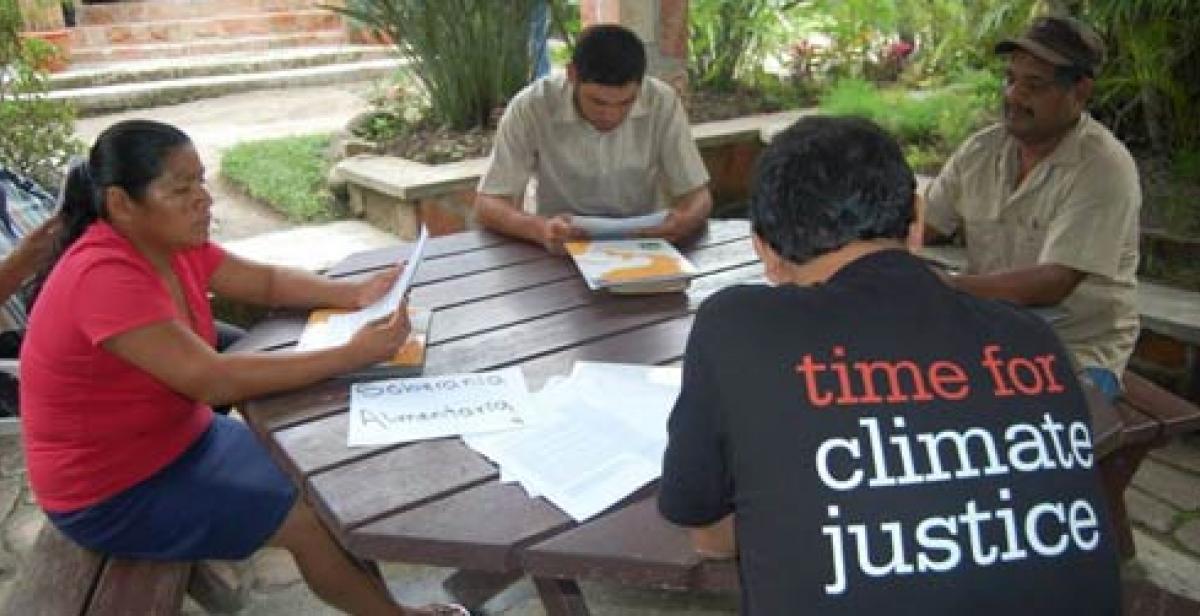The struggle for climate justice is in the balance. Maggie von Vogt reflects on why we're going to need more eggs on more spoons to win this race...
Things have been pretty discouraging in terms of climate justice in this part of the world. Since the COP16 conference in Cancun, I've noticed a generalized hopelessness in terms of what people feel can be accomplished within the UNFCCC structure. We know that we urgently need to create (or go back to?) a new way of relating to the Earth. But, as we hurtle towards a point of irreversible damage, it’s tempting to admit defeat, continue doing things as usual, and hope it all goes away.
But it won’t go away and we mustn’t give up. It feels like a slow but valuable process of realizing that no one is going to solve this problem for us, and also of realizing how much we already know. Facing climate change and its consequences is a huge challenge, but we are not starting from zero.
Thinking outside the UNFCCC box
Last month I was at the regional Climate Justice Conference, near Tegucigalpa, Honduras. The aim of the forum was to bring perspectives from local and national levels into a process of constructing “A Proposal for Sustainability for the Mesoamerican People in the Face of the Climate Crisis.”
Progressio partner organizations Unidad Ecológica Salvadoreña (UNES), Madre Tierra, and Popol Nah Tun were amongst the 50 participating organizations and 150 people. In addition to the El Salvador program, Progressio colleagues from the Honduras program also participated, which is an exciting advance in our efforts to coordinate and collaborate within the Central America programme.
I took part in the national meeting in El Salvador on August 25th. People from communities and organizations joined together to share local experiences in adaptation to climate change and proposals for sustainability. There was a strong representation of communities from the coastal zones, and it was inspiring to see people from this notoriously vulnerable area not only share how impacted they are by climate change, but also what they are doing to survive it.
Rejecting false solutions
One week later, representatives from the national Climate Justice Campaign joined their Mesoamerican colleagues to bring this dialogue to the regional level. This time community, environmentalist, labour, campesino, Afro-descendent, indigenous, and faith-based organizations from Guatemala, Honduras, Nicaragua, and El Salvador were also joined by representatives from organizations from Panama and Mexico.
This two day conference marks yet another step in the unfolding Mesoamerican Climate Justice Campaign, whose primary objectives are to promote the philosophy of Climate Justice, including 1) recognition of ecological debt 2) rejection of false solutions, such as REDD (the United Nations Collaborative Programme on Reducing Emissions from Deforestation and Forest Degradation in Developing Countries) megaprojects, which serve as a function of the market and continue to perpetuate exploitation of the planet instead of living in harmony with it.

High emissions countries must change their attitudes
According to Angel Ibarra (above), President of UNES, we are losing ground in the climate change negotiations. “Three weeks ago, when Hurricane Irene passed over the East Coast of the United States, a Republican Party Presidential hopeful publicly announced that climate change does not exist and that any initiatives to talk about or address climate change is a leftist farce,” Angel tells me. “We are still experiencing the negative, reactionary, and backward political postures of the Bush Presidency, and that’s why the negotiations are not advancing.”
It seems that so long as rich, high emissions countries maintain this attitude, there won't be advances in the UNFCC process. We should not trick ourselves into believing that the climate negotiations are independent from these global dynamics. “If they agree to give money for adaptation, there will be strings attached - any money they give, they will only give it to the countries they like," says Angel.
Panama, the next stop on the journey towards climate justice
We also had an opportunity to hear from the newest members of the campaign: the climate justice movement in Panama. Panamanian and Mesoamerican popular organizations are preparing an alternative forum to the official pre-COP meeting in Panama this October, "to address the reality of climate change in ways that the climate negotiators who will meet in Panama City October 1 to 7, probably will not."
Communities already being affected by false solutions such as REDD mega projects such as dams, the expansion of agro-fuels and other World Bank pilot projects in their region will gather to examine the causes of climate change, the nature of the climatic and ecological debt due to them, and to strengthen strategies of resistance and alternatives. Many people seemed hopeful and moved to support their colleagues from Panama, and various people from the campaign will attend the alternative forum to continue building networks and dialogues in the face of the climate crisis.
It's time to balance your eggs on more than one spoon
So... it's becoming clear that there isn't room for climate justice on the UNFCCC agenda. We can't ignore the UNFCCC structure, but it's also not worth putting all of our eggs in that basket.
It's a balance of staying in the game, and constructing new paradigms in which to continue forward in the quest to face the climate crisis, rooted in values of justice, solidarity, and harmony with the planet.
Next step: Panama. We need to voice our resistance and make it clear what we are against, but also continue creating networks and alternative spaces in which to propose, create, and build. Mesoamerica, and Latin America in general, has a rich history of resistance and social struggle, and is recognized as a region from which new visions and ideas are born.
For now, it’s time for the Mesoamerican Climate Justice Campaign to strive for the most positive results possible from Panama, and continue diversifying and strengthening work for a sustainable, just, and harmonious future for the planet.
Maggie von Vogt is a Progressio development worker with UNES (Unidad Ecológica Salvadoreña - The El Salvadorian Ecology Unit) in El Salvador.
See the Jubilee South blog for more information on the alternative forum and mobilizations for the Pre-COP.
Photographs: Above top - Members of the Climate Justice campaign sit down to discuss the climate crisis. Above mid text - Angel Ibarra, President of UNES, gives a presentation at the Climate Justice Conference. (Photos © Maggie von Vogt/Progressio)



